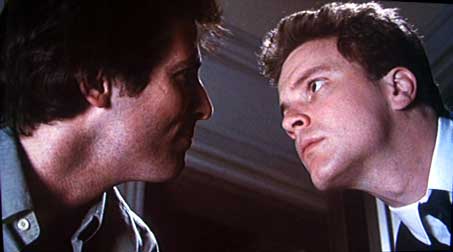|
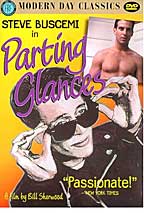
Parting
Glances
First Run Features,
1986
Director/Screenplay:
Bill Sherwood
Starring:
Richard Ganoung,
John Bolger,
Steve Buscemi,
Adam Nathan,
Kathy Kinney,
Patrick Tull,
Yolande Bavan
Rated R, 90 minutes
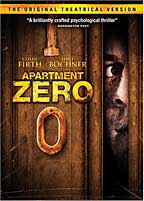
Apartment
Zero
Anchor Bay
Entertainment,
1989
Director:
Martin Donovan
Screenplay:
Martin Donovan,
David
Koepp
Starring:
Colin Firth,
Hart Bochner,
Dora Bryan, Liz Smith, Fabrizio Bentivoglio, James Telfer, Mirella D'Angelo,
Juan Vitali
Rated R, 124 minutes
|
Two
Classics Revisted
by Michael D. Klemm
First reviewed in
Outcome, April, 1998
Revised in Outcome, November,
2000
The number of gay-themed
films that are released commercially have multiplied over the last few
years. Because of their easier availability, it is often easy to forget
the trailblazers that came before. This month I would like to revisit,
and augment, the first column that I wrote for Outcome
two years ago. It featured two of my personal favorites, Parting
Glances and Apartment Zero.
Each is a classic in its own right.
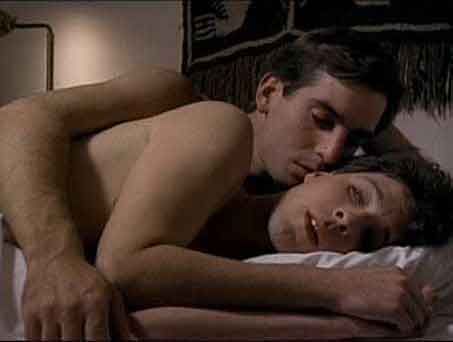
Parting
Glances
(1986), written and directed by the late Bill Sherwood, is still one of
the best gay-themed independent films ever released. Parting
Glances details
24 hours in the lives of Michael and Robert, (Richard
Ganoung and John Bolger), a longtime couple, living in New York City,
who are about to temporarily separate. Michael is a freelance book editor
who is wielding the blue pencil to a friend's S&M science fiction novel
(and hating every minute of it) while Robert's position with a world health
organization is forcing his relocation overseas to Africa. ("Robert,
this is the equator," Michael says, pointing to a map. "Why
are you packing so many sweaters?") Despite vast political differences,
they are firmly committed to one another. Michael is an activist at heart.
Robert, despite his job, is unable to deal with disease except as an abstract,
and is content to do his part by pushing beaurocratic papers behind a
desk
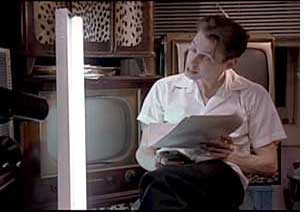 Further
complicating their lives is Michael's first lover, a punk rock performer
named Nick (Steve Buscemi, before he made a career out of playing psychos
in action movies). Nick has been diagnosed with AIDS, and Robert is jealous
of the amount of time that Michael spends taking care of him. It is mostly
because of Nick that Robert chose the job transfer - a betrayal that does
not sit well with Michael when he realizes the truth. Not only does Robert
wish to be absent when Nick dies, he also knows, deep down, that Nick
was always the great love of Michael's life. The film shows how Michael
copes while balancing the potential loss of both his partner and his best
friend. Their emotions are finely tuned without hitting any false notes. Further
complicating their lives is Michael's first lover, a punk rock performer
named Nick (Steve Buscemi, before he made a career out of playing psychos
in action movies). Nick has been diagnosed with AIDS, and Robert is jealous
of the amount of time that Michael spends taking care of him. It is mostly
because of Nick that Robert chose the job transfer - a betrayal that does
not sit well with Michael when he realizes the truth. Not only does Robert
wish to be absent when Nick dies, he also knows, deep down, that Nick
was always the great love of Michael's life. The film shows how Michael
copes while balancing the potential loss of both his partner and his best
friend. Their emotions are finely tuned without hitting any false notes.
On my first viewing
of Parting Glances, back in
1986, I found it to be the most natural and realistic portrayal of gay
men to ever grace the screen. (Please remember that, unlike today, this
phenomenon was not common.) We watch as a small group of friends, confident
in their professions and sophisticated in the ways of the world, attempt
to smoothly manage their relationships. The film's centerpiece is Robert's
farewell party, which takes place at an artist's loft. Sherwood's skill,
when sketching realistic and colorful characters, is especially evident
here as he presents people from all varied walks of gay life. The guests
include the overweight author who penned the S&M Sci-fi novel. He is stalking
all the young men at the party and finally hits on a priest who recently
left the seminary. A lone straight man vainly cruises the party in search
of available women. Robert reminisces with a high school girl friend who
states that she always knew that he was gay because he was "just
too cute" to be straight, and Nick is asked to appear in a play by
an Ingmar Bergman wannabe performance artist who wishes to stage a show
in which all the actors are terminally ill. ("Imagine the intensity!")
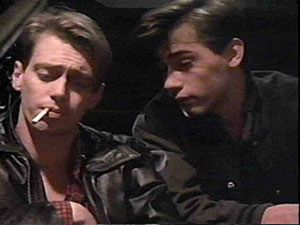 Sherwood's
uncanny ability to write great truths into a simple dialogue exchange
reaches its zenith during a scene on the stairs, outside of the party,
between two generations of gay men. A drunk young man, in lust with Michael,
recognizes Nick from his videos and engages him in conversation. To him,
Nick personifies a world of pre-AIDS sexual liberation while he represents
a gay future Nick will never know. In perhaps one of the most telling
explanations of gay awakening ever put on screen, the young record store
clerk remembers telling his parents that he didn't choose this
lifestyle, this lifestyle chose him. All he had to do to know that
he was gay was ask his penis because it doesn't lie. Sherwood's
uncanny ability to write great truths into a simple dialogue exchange
reaches its zenith during a scene on the stairs, outside of the party,
between two generations of gay men. A drunk young man, in lust with Michael,
recognizes Nick from his videos and engages him in conversation. To him,
Nick personifies a world of pre-AIDS sexual liberation while he represents
a gay future Nick will never know. In perhaps one of the most telling
explanations of gay awakening ever put on screen, the young record store
clerk remembers telling his parents that he didn't choose this
lifestyle, this lifestyle chose him. All he had to do to know that
he was gay was ask his penis because it doesn't lie.
Despite the film's
mostly comic tone, Parting Glances
was made in 1986 and the spectre of AIDS looms heavily over the proceedings.
Survivor guilt is especially prevalent when Michael confesses that, every
time he looks at Nick, all he can think is "thank God, I don't
have it." While preparing a dinner for his friend, Michael accidentally cuts himself with one of Nick's knives. In a telling illustration of how conflicting and hysterical the information about AIDS was at the time, Michael's momentary panic (could the knife be infected?) is accompanied by an image of a grinning Nick extending a feather towards him - a "passing the torch" symbol that will recur later during an important flashback. Nick's own
reaction to his condition is a mix of anger and acceptance. Music will
play an important role as he lays in his bed and listens to Don Giovanni
as a prelude to a surreal moment when a deceased friend appears, wearing
a suit of armor as Mozart's Commendatore, to tell him that heaven is boring
and to cling onto life as long as he can.
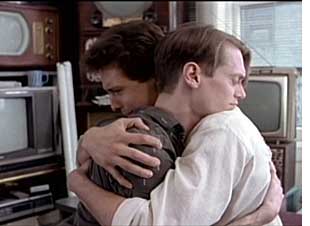 The
two male leads are attractive, and their brief love scenes are sexually
charged. Richard Ganoung (Michael) would go on to play a similar role
opposite Sean Hayes in Billy's
Hollywood Screen Kiss more than a decade later. Steve Buscemi,
however, steals the show as Nick. He is both angry and sarcastic about
his illness, and picks on Michael for being a mother hen and for marrying
Robert who "looks like a fuckin' Ken doll." In its depiction
of everyday
Manhattan life, Parting Glances
is similar to a Woody Allen film in tone. The humor is both witty and
biting. Sherwood's screenplay is filled with rich characterizations and
attention to detail. Unlike many scripts, this one actually improves on
subsequent viewings. The
direction is superb and the soundtrack is effectively peppered with many
known tunes of the day, most memorably Jimmy Sommerville and The Bronski
Beat's "Smalltown Boy" and "Why." The scene where
Michael embraces Nick, after telling him him that he was always the true
love of his life, is one of the most iconic images in all of queer cinema.
No matter how many times I see the film, this moment still reduces me
to tears, The
two male leads are attractive, and their brief love scenes are sexually
charged. Richard Ganoung (Michael) would go on to play a similar role
opposite Sean Hayes in Billy's
Hollywood Screen Kiss more than a decade later. Steve Buscemi,
however, steals the show as Nick. He is both angry and sarcastic about
his illness, and picks on Michael for being a mother hen and for marrying
Robert who "looks like a fuckin' Ken doll." In its depiction
of everyday
Manhattan life, Parting Glances
is similar to a Woody Allen film in tone. The humor is both witty and
biting. Sherwood's screenplay is filled with rich characterizations and
attention to detail. Unlike many scripts, this one actually improves on
subsequent viewings. The
direction is superb and the soundtrack is effectively peppered with many
known tunes of the day, most memorably Jimmy Sommerville and The Bronski
Beat's "Smalltown Boy" and "Why." The scene where
Michael embraces Nick, after telling him him that he was always the true
love of his life, is one of the most iconic images in all of queer cinema.
No matter how many times I see the film, this moment still reduces me
to tears,
Parting
Glances is a wonderful film in which all of the gay characters
are presented naturally, and not defined simply by their sexuality. The
human issues raised throughout make Parting
Glances
universal and timeless. It is a shame that this was director Sherwood's
only film. He
died from AIDS complications in 1990.
|
|
Beunos Aires is the
setting for Martin Donovan's Apartment Zero
(1989), a psychological thriller with gay undercurrents.
Don't be deceived by the videotape box which simply remarks that two men
share an apartment and that "one of them is a cold-blooded serial killer."
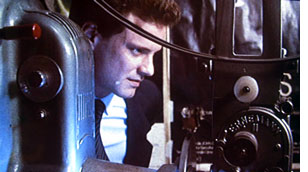 Colin
Firth stars as Adrian LeDuc, an introverted, paranoid, and sexually
repressed young man who runs an old movie theater that shows only classic
films. His apartment is filled with framed photographs of movie icons
like James Dean, Montgomery Clift and Elizabeth Taylor. He's a kindred
soul to Felix Unger, and his mother is currently confined to a mental
hospital. His colorful neighbors in the apartment building think him odd
because he keeps to himself. Because his theater is losing money, Adrian
reluctantly decides to advertise for a roommate. Colin
Firth stars as Adrian LeDuc, an introverted, paranoid, and sexually
repressed young man who runs an old movie theater that shows only classic
films. His apartment is filled with framed photographs of movie icons
like James Dean, Montgomery Clift and Elizabeth Taylor. He's a kindred
soul to Felix Unger, and his mother is currently confined to a mental
hospital. His colorful neighbors in the apartment building think him odd
because he keeps to himself. Because his theater is losing money, Adrian
reluctantly decides to advertise for a roommate.
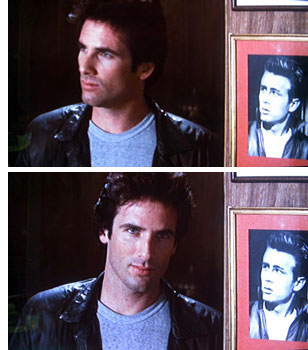 Enter
the roommate, Jack Carney, played by Hart Bochner. His entrance trumpets
Adrian's closeted sexuality to the audience. The attraction between them
is immediate. Jack, wearing a black leather jacket, is tall, dark and
smolderingly handsome. From Adrian's point of view, he walks into the
apartment, stands next to a framed photograph of James Dean, and gazes
directly at the camera. His smile is both seductive and threatening. Jack
seems amused by Adrian's nervousness, but the sexual tension as the two
men look each other over is electric. Enter
the roommate, Jack Carney, played by Hart Bochner. His entrance trumpets
Adrian's closeted sexuality to the audience. The attraction between them
is immediate. Jack, wearing a black leather jacket, is tall, dark and
smolderingly handsome. From Adrian's point of view, he walks into the
apartment, stands next to a framed photograph of James Dean, and gazes
directly at the camera. His smile is both seductive and threatening. Jack
seems amused by Adrian's nervousness, but the sexual tension as the two
men look each other over is electric.
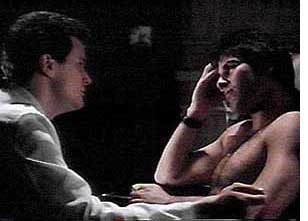 While
a number of execution styled murders in town persist in the background,
the film emphasizes the growing friendship, and tension, between the two
men. Jack becomes a hit with the neighbors to Adrian's horror. While Adrian
refuses to even talk to them, Jack sleeps with almost everyone
in the building... a young gay man, a lonely married woman, a sad transvestite.
All of the tenants seem to fall under Jack's "spell," especially
Adrian. While
a number of execution styled murders in town persist in the background,
the film emphasizes the growing friendship, and tension, between the two
men. Jack becomes a hit with the neighbors to Adrian's horror. While Adrian
refuses to even talk to them, Jack sleeps with almost everyone
in the building... a young gay man, a lonely married woman, a sad transvestite.
All of the tenants seem to fall under Jack's "spell," especially
Adrian.
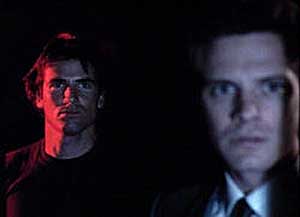 The
second half of the film becomes a psychological mindgame worthy of Hitchcock
as it becomes clear that Jack is not what he appears to be. Where does
he go at night? What are those pictures, taken at a military camp, doing
in his room? As Adrian's need for Jack becomes almost obsessive, the world
unravels for them both. Rather than opting for cheap thrills and the usual
suspense cliches, the tension in Apartment
Zero builds in subtle ways. Like Roman Polanski did in
Repulsion, Rosemary's Baby and The Tenant, director Martin
Donovan explores the cinematic possibilities inherent within the apartment
itself. As the tension builds, the large apartment seems to shrink. Characters
are filmed in constricted camera set-ups; walls and ceilings seem to close
in during many agitated scenes. The
second half of the film becomes a psychological mindgame worthy of Hitchcock
as it becomes clear that Jack is not what he appears to be. Where does
he go at night? What are those pictures, taken at a military camp, doing
in his room? As Adrian's need for Jack becomes almost obsessive, the world
unravels for them both. Rather than opting for cheap thrills and the usual
suspense cliches, the tension in Apartment
Zero builds in subtle ways. Like Roman Polanski did in
Repulsion, Rosemary's Baby and The Tenant, director Martin
Donovan explores the cinematic possibilities inherent within the apartment
itself. As the tension builds, the large apartment seems to shrink. Characters
are filmed in constricted camera set-ups; walls and ceilings seem to close
in during many agitated scenes.
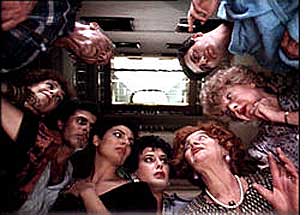 Unlike
most thrillers, there is fine character development, and the plot is not
predictable. A political angle is introduced when the murders are thought
to have been committed by a former government mercenary and this adds
to the film's creepy believability. But what makes this film really
stand out is the sexual tension between Adrian and Jack. Adrian's obsession
with the cinema is central to the themes of appearance vs. reality. Adrian
would rather lose himself in the movies than talk to real people, and
Jack functions for him as a film icon that has come to life. "If
that is a mask," he tells Jack, "Take it off now or keep it
on forever." Jack also forces Adrian to confront his true identity
by asking questions like "who do you want me to be?" It would
be a crime to say anything more about the plot, except to note that the
conclusion is one of the most disturbing in modern cinema. I guarantee
that you will never forget it. It is well worth a look. Unlike
most thrillers, there is fine character development, and the plot is not
predictable. A political angle is introduced when the murders are thought
to have been committed by a former government mercenary and this adds
to the film's creepy believability. But what makes this film really
stand out is the sexual tension between Adrian and Jack. Adrian's obsession
with the cinema is central to the themes of appearance vs. reality. Adrian
would rather lose himself in the movies than talk to real people, and
Jack functions for him as a film icon that has come to life. "If
that is a mask," he tells Jack, "Take it off now or keep it
on forever." Jack also forces Adrian to confront his true identity
by asking questions like "who do you want me to be?" It would
be a crime to say anything more about the plot, except to note that the
conclusion is one of the most disturbing in modern cinema. I guarantee
that you will never forget it. It is well worth a look.
Both of these films,
to the best of my knowledge, were never seen theatrically in Buffalo,
but both films are available on video. You might find
Apartment Zero at Blockbuster Video but both are available
at Buffalo's more adventurous outlets, Mondo Video and Rainbow Pride.
[Update for 2007: Apartment Zero
is now available on DVD in its original 124 minute theatrical version.
Click here for more details.]
More
on Richard Ganoung:
Billy's
Hollywood Screen Kiss
More On Colin
Firth:
Another Country
A
Single Man
|


